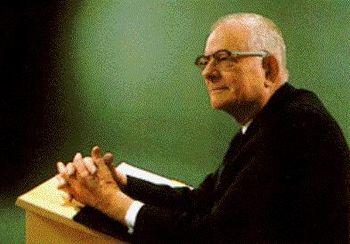W. Edwards Deming (Photo credit: Wikipedia)
I’m not sure why I avoided reading this book for more than a dozen years. Perhaps it was its title that turned me off. Nevertheless, I am glad I finally found a reason to read Profit Beyond Measure: Extraordinary Results through Attention to Work and People by H. Thomas Johnson and Anders Bröms.
Unlike my original conception of the title, this book isn’t about immeasurable profits (although it is certainly about making more and more consistent profits). This book is about how trying to manage a company by looking at “the numbers”—e.g., profits and return on investment—is like “baseball managers trying to coach their teams by looking at the scoreboard.”
Indeed, this book is about the tremendous and enduring success of companies like Toyota and Scania, which is achieved not by “management by results,” but by “management by means”—learning to manage a living system made up of real human beings. This book directs us toward “management by attentiveness.”
“What firms like Toyota and Scania have learned to do is develop sophisticated [yet, simple] methods of paying close attention in the production and design processes, so that high levels of performance and high rates of learning occur naturally,” says Peter Senge in the book’s foreword.
“Management by results creates ‘needs,’ goals we feel we must achieve for our survival or for personal gain. Management by means nurtures aspirations, aims that we pursue because they matter to us. The difference is subtle yet profound…. As poet Robert Frost put it, ‘All great things are done for their own sake,” Senge cogently highlights.
So what has management by means done for Toyota and Scania? Toyota is the most profitable automaker in the world today and Scania has produced more than 70 profitable years in succession—regardless of the ups and downs of the world’s economy. While both of these companies have taken significantly different paths to achieve high levels of profits, neither have taken the path of traditional American companies in setting cost or profit objectives and then resorted to driving people to meet those targets.
As W. Edwards Deming warned [also quoted in the foreword to the book], “[I]f management sets quantitative targets and makes people’s jobs depend on meeting them, ‘they will likely meet the targets—even if they have to destroy the enterprise to do it.’” We have seen such self-destructive behaviors in U.S. manufacturers over the last several decades, but hardly is it more plainly evident than in our U.S. auto industry.
I think you’ll appreciate how Profit Beyond Measure brings humanity and humaneness back to management while also achieving high levels of profitability. I am confident that you will find great personal relief and satisfaction in discovering—or, perhaps, re-discovering—a management philosophy that allows us as executives and managers to really feel that helping our employees and vendors realize their full potential in serving our customers is also the best way to help our companies achieve durable success and ongoing profits.
Note particularly chapter one’s “Lessons from the Rouge,” and how U.S. automakers felt compelled to invest huge amounts of capital and overhead into “the information factory” alongside their materials production factory, thus adding layers of complexity to their operations. On the other hand, Toyota sought solutions that were inherently simple, but extremely effective. I think it is likely that you will find parallels in your own company’s experience if I am not mistaken.
By the way, I think this book is “the missing link” in my own thinking as to why the Thinking Processes and Theory of Constraints is so powerful. While couched in entirely different language, the Theory of Constraints and its Thinking Processes endeavor to “unlock tribal knowledge,” thus humanizing, comprehending and documenting the real human interactions that occur within an organization, and then, linking those unmasked and very real human interactions to the hindrances that are keeping the organization from producing more and more consistent profits.
------------------------------------------------------------
Leave your comments here. We are anxious to hear what you have to say. Or, if you prefer, you may contact us directly.




